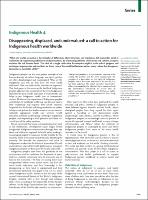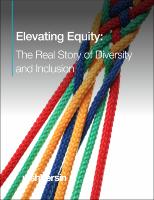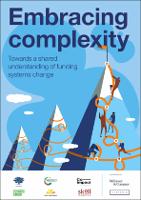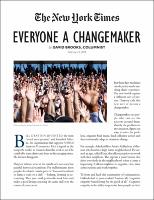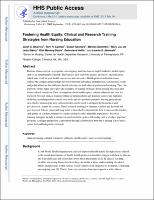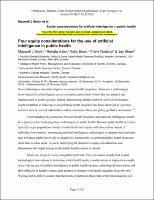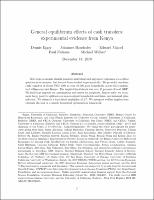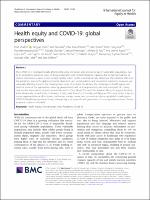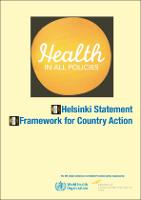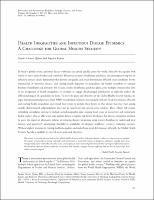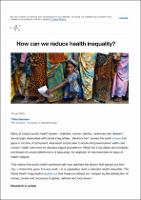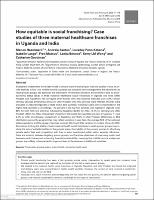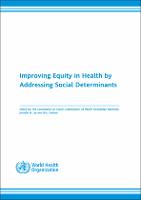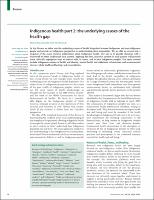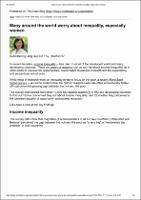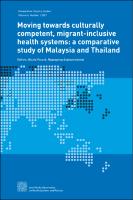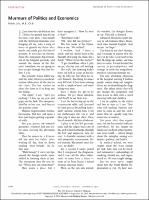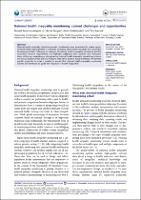Browsing 1.02.02 Health in All Policies by Title
Now showing items 20-39 of 51
-
Deconstructing development discourse: buzzwords and fuzzwords
(Practical Action Pub. ; Oxfam, 2010)
"Writing from diverse locations, contributors critically examine some of the key terms in current development discourse. Why should language matter to those who are doing development? Surely, there are more urgent things to do than sit around mulling over semantics? But language does matter. Whether emptied of their original meaning, essentially vacuous, or hotly contested, the language of development not only shapes our imagined worlds, but also justifies interventions in real people's lives. If development buzzwords conceal ideological differences ... -
Embracing complexity Towards a shared understanding of funding systems change
(2020-01)
The report is the result of collaboration between Ashoka and McKinsey & Company, as well as social entrepreneurs from Catalyst 2030, Co-Impact, Echoing Green, Schwab and Skoll and SystemIQ. How can systems change across the world be financed more effectively? How can change be better supported for the benefit of society? “Embracing complexity – Towards a shared understanding of funding systems change” provides donors and investors, as well as charitable initiatives and organizations, with answers to these questions. A clearly defined vision, ... -
Equity, Diversity & Inclusion: A resource guide for Leaders in Collegiate Recreation
(NIRSA Commission on Equity, Diversity & Inclusion, 2019-02)
The publication, Equity, Diversity & Inclusion: A resource guide for Leaders in Collegiate Recreation, compiles foundational concepts, research-driven best practices, and case studies to help campus recreation professionals develop competencies around EDI – for their own personal and professional growth, as well as for their departments. The publication includes the following: Introduction to equity, diversity, and inclusion and the NIRSA EDI Identity Wheel. Definitions for a broad range of terminology associated with the nine identities focused ... -
Everyone a changemaker
(The New York Times, 2018-02-09) -
Fostering Health Equity: Clinical and Research Training Strategies from Nursing Education
(The Kaohsiung Journal of Medical Sciences, 2009)
Racism, ethnocentrism, segregation, stereotyping, and classism are tightly linked to health equity and social determinants of health. They lead to lack of power, money, resources, and education which may result in poor health care access and outcomes. Health profession faculties must address the complex relationships that exist between individual, interpersonal, institutional, social and political factors that influence health outcomes in both clinical and research training. Thus, the purposes of this paper are to provide examples of training ... -
General Equilibrium Effects of Cash Transfers: Experimental Evidence from Kenya
(National Bureau of Economic Research, 2019-12)
How large economic stimuli generate individual and aggregate responses is a central question in economics, but has not been studied experimentally. We provided one-time cash transfers of about USD 1000 to over 10,500 poor households across 653 randomized villages in rural Kenya. The implied fiscal shock was over 15 percent of local GDP. We find large impacts on consumption and assets for recipients. Importantly, we document large positive spillovers on non-recipient households and firms, and minimal price inflation. We estimate a local fiscal multiplier ... -
Health equity and COVID-19: global perspectives
(2020-12)
The COVID-19 is disproportionally affecting the poor, minorities and a broad range of vulnerable populations, due to its inequitable spread in areas of dense population and limited mitigation capacity due to high prevalence of chronic conditions or poor access to high quality public health and medical care. Moreover, the collateral effects of the pandemic due to the global economic downturn, and social isolation and movement restriction measures, are unequally affecting those in the lowest power strata of societies. To address the challenges to ... -
Health in all policies: Helsinki statement. Framework for country action
(World Health Organization, 2021)
The participants to the 8th Global Conference on Health Promotion endorsed the Helsinki Statement on Health in All Policies In which they prioritize health and equity as a core responsibility of governments to its peoples, affirm the compelling and urgent need for effective policy coherence for health and well-being and recognize that this will require political will, courage and strategic foresight. The participants of the Conference call on governments to fulfill their obligations to their people’s health and wellbeing by taking a number of ... -
Health Inequalities and Infectious Disease Epidemics: A Challenge for Global Health Security
(2014)
In today's global society, infectious disease outbreaks can spread quickly across the world, fueled by the rapidity with which we travel across borders and continents. Historical accounts of influenza pandemics and contemporary reports on infectious diseases clearly demonstrate that poverty, inequality, and social determinants of health create conditions for the transmission of infectious diseases, and existing health disparities or inequalities can further contribute to unequal burdens of morbidity and mortality. Yet, to date, studies of influenza ... -
How can we reduce health inequality?
(2015-01-19) -
How equitable is social franchising? Case studies of three maternal healthcare franchises in Uganda and India
(Oxford University Press in association with The London School of Hygiene and Tropical Medicine, 2018-04-01)
Substantial investments have been made in clinical social franchising to improve quality of care of private facilities in low- and middle-income countries but concerns have emerged that the benefits fail to reach poorer groups. We assessed the distribution of franchise utilization and content of care by socioeconomic status (SES) in three maternal healthcare social franchises in Uganda and India (Uttar Pradesh and Rajasthan). We surveyed 2179 women who had received antenatal care (ANC) and/or delivery services at franchise clinics (in Uttar Pradesh ... -
Improving equity in health by addressing social determinants
(World Health Organization, 2011)
This recently published book highlights actions to improve health equity based on findings from the nine global Knowledge Networks that were established during the WHO Commission on Social Determinants of Health. Their task was to synthesize existing evidence and identify effective and appropriate actions to improve health equity in nine thematic areas: - globalization; - gender; - social exclusion; - early child development; - urban settings; - employment conditions; - health systems; - public health programs; and - measurement and evidence. ... -
Indigenous health part 2: the underlying causes of the health gap
(The Lancet, 2009) -
Many around the world worry about inequality, especially women
(World Bank Blog, 2017) -
Moving towards culturally competent, migrant-inclusive health systems: a comparative study of Malaysia and Thailand
(the Asia Pacific Observatory on Health Systems and Policies, 2021)
Migrants are seldom included in policy discussions on the provision of health care, and in country policy reforms towards health for all. In addition, evidence on health care for migrant populations to inform and guide policy makers is limited. This Comparative Country Study (CCS) uses mixed-method approaches to analyse the extent to which two middle-income countries – Thailand and Malaysia, have culturally competent, migrant-inclusive health systems. The countries have taken different approaches to developing a migrant-inclusive health system. ... -
Murmurs of Politics and Economics
(New England Journal of Medicine, 2018-09-27) -
National health inequality monitoring: current challenges and opportunities
(Informa UK Limited, trading as Taylor & Francis Group, 2018-12-03)
National health inequality monitoring needs considerably more investment to realize equityoriented health improvements in countries, including advancement towards the Sustainable Development Goals. Following an overview of national health inequality monitoring and the associated resource requirements, we highlight challenges that countries may encounter when setting up, expanding or strengthening national health inequality monitoring systems, and discuss opportunities and key initiatives that aim to address these challenges. We provide specific ...


